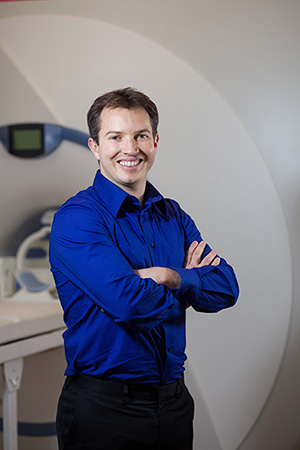When someone gives you a gift or does you a favor, what’s happening in your brain?
That’s what researchers from USC’s Department of Psychology and Brain and Creativity Institute have just discovered, with the help of testimony from the Visual History Archive. The research team of Glenn Fox, Jonas Kaplan, Hanna Damasio and Antonio Damasio has revealed its findings in the paper “Neural correlates of gratitude,” now published in the academic journal Frontiers in Psychology.
The team of neuroscientists wanted to find out how feelings of gratitude correlate with activity in the brain – something that has not previously been studied extensively. In order induce feelings of gratitude in their study participants while the participants underwent functional magnetic resonance imaging (a brain scanner), Fox and a team of research assistants turned to USC Shoah Foundation’s Visual History Archive.
Fox (below) and his assistants combed through the archive for testimonies in which Holocaust survivors described receiving gifts or help from others. For example, a survivor might describe a fellow prisoner in a concentration camp giving him a piece of bread when he was hungry, or a farmer providing refuge for his family on a cold night. They then rewrote these incidents as first-person scenarios, so the study participants could easily imagine themselves in the survivor’s shoes.

Glenn Fox
While in the brain scanner, participants first watched a short documentary detailing the events of the Holocaust. They were then shown each of the “stimuli,” or gift-giving scenarios, and asked to imagine, for several seconds, themselves in that position and to form as deep, personal and realistic of a reaction as they could. Finally, they rated how much gratitude they felt in response to the gift on a scale of one to four, four being an overwhelming sense of gratitude. The scanner recorded which areas of their brain were active during the experiment.
The researchers found that feelings of gratitude correlated with activity in areas of the brain responsible for stress relief, subjective value judgments, fairness and economic decision-making. They also found that gratitude overlapped with morality, social reward and interpersonal bonding.
Fox said prior to publication that the research supports his hypothesis that effort and need correlate with gratitude – that even gifts that aren’t quite as needed but require great effort by the giver elicit strong feelings of gratitude (“it’s the thought that counts”) – but it also demonstrates that the amount of need for a gift correlated more strongly with high ratings of gratitude than the effort exerted by the gift-giver.
They also found that gratitude activated regions in the brain associated with understanding both the “self” and “other,” which may mean that gratitude emerges from understanding others’ minds in conjunction with our own needs.
The brain imaging demonstrated that specific areas of the brain are activated when people experience gratitude – even though gratitude is such a complex, wide-ranging emotion.
“To know better what regions [in the brain might be responsible for gratitude] is a really great first step toward understanding how we can advance and promote gratitude in the world,” Fox said.
He said the research was made stronger by the help and support from USC Shoah Foundation and its staff, particularly curator Crispin Brooks, former associate director of research Dan Leshem, and research assistant Syuzanna Petrosyan.
“Not only were we able to break new ground on the important topic of gratitude, we did so in a way that carries meaning and significance for society at large,” Fox said. “I hope this research serves as a template for future researchers in the sciences and the humanities for how a powerful resource like USC Shoah Foundation can lead to groundbreaking results.”
Reposted with kind permission of USC Shoah Foundation. This article was originally published on the USC Shoah Foundation website.
Enliven Your Spirit
Join us February 24 - 28, 2025 for a self-guided series that will offer inspiration and grateful living practices to grow your spiritual toolbox and help you feel more alive, present, and fulfilled.


Comments are now closed on this page. We invite you to join the conversation in our new community space. We hope to see you there!